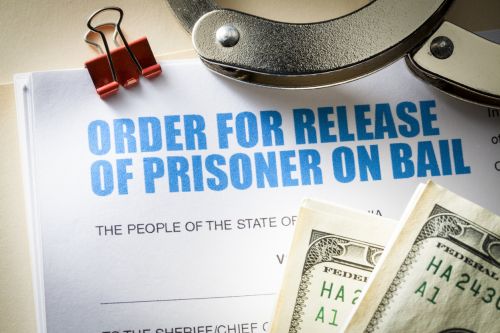Menu
Posting Bail in a Wyoming Criminal Case
November 18th, 2019

Do You Need to Work with a Bondsman if You’ve Been Arrested?
Posting bail allows someone who has been charged with a crime to get out of jail and remain out until they go to trial.
Bail is the money deposited with a court that persuades a judge to allow a person to be released with the understanding that they will return to court for trial.
A judge sets bail to ensure that the defendant will appear at trial without the need to keep the defendant in custody. Bail is set at an amount high enough that the defendant will not simply forfeit the bail amount and disappear.
Once the judge has set a bail amount in your case, you can post the bail with the court. You will receive a receipt proving that the bail was posted.
If you do not return to court on the specified date, the court will schedule a forfeiture hearing and issue a warrant for your arrest. You will have an opportunity to explain why you missed court. This might include a misunderstanding or an unavoidable delay. But judges do not look favorably on people who miss court. If you have a court date, you must make it a priority and do what it takes to appear. Exceptions might include personal health emergencies or family emergencies.
How Does the Judge Set Bail?
In some cases, bail is set at a certain amount based on the crimes the defendant was charged with committing.
In others, the bail amount will depend on the severity of the alleged offense, the likelihood that the defendant will commit other crimes after being released, and the chances that the defendant will flee the court’s jurisdiction before trial.
After a person is arrested, the judge will set a bail amount, along with any other conditions for the defendant’s release from jail. Possible options include:
- Citation Release - Wyoming law requires that people who have been arrested be brought before a judicial officer within 12 hours. If that does not happen, the defendant will be issued a citation and released from custody. The defendant must sign an agreement to appear at the date and time on the citation for his court hearing.
- Cash Bond - If the defendant has the money or can get help from a co-signer, the defendant can pay the entire bail amount and be released from jail. The money is paid directly to the court, and will be returned as long as the defendant appears at all court appointments.
- Released on Own Recognizance - If the defendant does not have a criminal record and is not considered a risk to appear at future court hearings, the defendant can be released after signing an agreement to appear in court for the next scheduled hearing. No bail is set, and the defendant does not pay anything to be released from jail.
- Release Under Supervision - When court officials have concerns about whether a defendant will appear at future court hearings, the court may order the defendant to be released under supervision. The defendant is released without bail, but remains under the supervision of an organization, an individual, or a pretrial release program that is responsible for helping to ensure that the defendant will appear at future court hearings.
- Surety Bond - When a defendant cannot pay the entire amount of bail, a defendant can engage the services of a bail bondsman who will provide a surety bond. The bondsman guarantees the entire bail amount. If the defendant does not appear, the court will order the bail bondsman to pay the entire amount. The bondsman can then seek to recover the entire bail amount from the defendant or any co-signer.
- Bail Denied - The court denies bail because the defendant is too much of a flight risk
What Is the Difference Between Bond and Bail?
Bail and bond are often used interchangeably. While they are closely related to one another, they are not quite the same thing.
Bail is the money the defendant must pay in order to be released.
A bond is posted on the defendant’s behalf, often by a bail bond company to secure the defendant’s release.
Should You Work with a Bondsman?
A bondsman is a professional agent who posts bail on behalf of a defendant.
You are not required to use a bail bondsman. Depending on the conditions of bail and the bail amount set by the judge, you may be able to post a portion of the bond.
To post bail you will likely need a cashier’s check or cash.
If you decide to work with a bondsman, the bondsman will charge a non-refundable fee (usually 10%), plus fees and expenses. If the defendant fails to appear in court, the bail bondsman forfeits the entire bond amount. The bondsman is then authorized to arrest the defendant for the purpose of bringing him to court, and can file a civil lawsuit to recover the money paid to the court.
Using a bondsman can make it affordable for the average person, who may not be able to afford to pay the full bail amount, to post bail.
But remember, even if the defendant satisfies all the demands of the court, the bondsman will not return the bail bond amount. This is the bondsman’s fee for assuming the liability that the defendant won’t appear for court.
Do You Get Bail Money Back?
Paying a bail agent to post bond is cheaper than paying the full amount of the bond. The 10% bond premium is non-refundable, but it is often less expensive than paying the full bail.
If you post bail by paying the court directly and the defendant attends all the required court appearances, the bail money will be returned. But if the defendant does not appear for court or is arrested again, the bond money is forfeited.
When deciding whether to use a bondsman, remember that court cases can last for a long time, and that there is a chance something will come up that will result in the defendant missing a court date. If this happens, the bail amount will be forfeited.
Before You Post Bail, Contact an Experienced Criminal Defense Team
If you or someone you care about was charged with a crime, you need an experienced criminal defense team on your side to protect your one shot at justice.
Our founder, Wyoming criminal defense attorney Christina L. Williams, is a former prosecutor who has dedicated her career to criminal law.
The team of criminal defense professionals at the Just Criminal Law Group has the experience and expertise to investigate the charges, challenge the evidence, and fight hard to have your case dismissed, to negotiate a favorable plea arrangement, or to fight for a Not Guilty verdict at trial.
If you have questions, and to get started on your defense, contact Just Criminal Law Group today. Call us at 307-686-6556, email inquiry@justcriminallaw.com, or complete our online form. You only have one shot at justice - don’t leave it to chance.
DISCLAIMER: The information contained in this article is offered for educational purposes only. This information is not offered as legal advice. A person accused of a crime should always consult with an attorney before making decisions that have legal consequences.
Categories: Criminal Charges - General Questions





